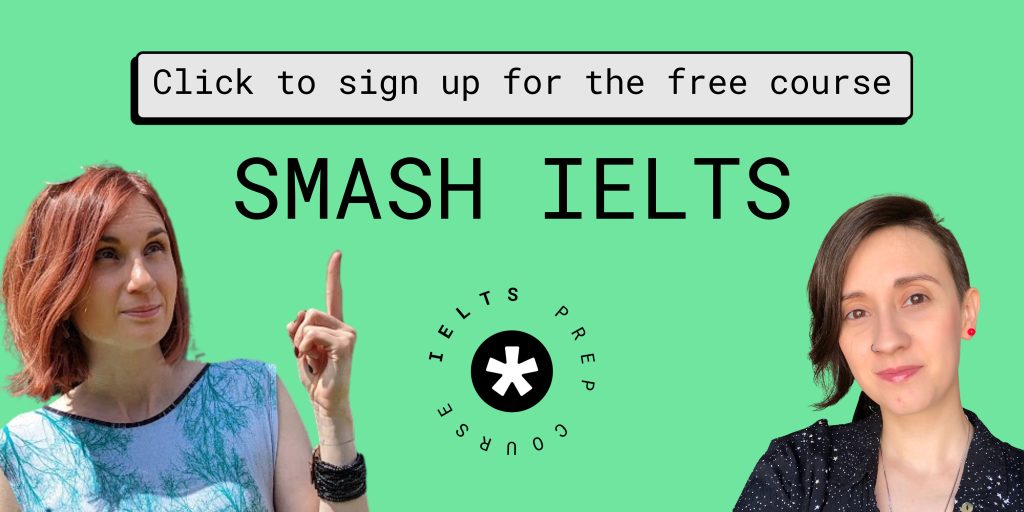Much like grammar, which we talked about in this post, vocabulary is not included in the four main skills tested in the IELTS: reading, listening, writing, and speaking. However, having a good vocabulary range is essential to help you achieve the IELTS band you need.
In the speaking and writing parts of the test, the IELTS examiner will analyse how accurately you use vocabulary, including its collocations and appropriate prepositions. You will also be assessed on your vocabulary range, which means how extensive your vocabulary is. Do you only use basic vocabulary? Do you repeat the same words over and over? Or do you use lots of different words and synonyms flexibly to express yourself? Showing variety in your speech and your writing is crucial in order to score higher in the test. To learn more about the IELTS marking criteria, visit this page – vocabulary is referred to as ‘lexical resource’.
Incorrect spelling can cost you points when completing the tasks in the reading and listening parts of the IELTS exam. Additionally, tasks may paraphrase the information in the text or recording, which means the same information will be written down in a different way. Paraphrasing is an extremely helpful tool for the IELTS, not only to understand and complete the activities, but also to improve your writing and your speech. Therefore, it’s important to practise and get used to expressing the same thing in different ways – learning synonyms is of great help for that!
We come across new vocabulary all of the time:
- When reading books, magazines, newspapers, etc
- When listening to the news, podcasts, music, etc
- When watching series, films, videos on YouTube, the news, etc
- When playing video games
- In conversation
- When going through IELTS practice tests and/or sample questions (you can find some here)
It is possible to understand unknown words by the context in which they are used, but in order to really learn and incorporate them into your language use, it is important to take some action. Expanding your vocabulary range involves being exposed to new words, learning their meanings and their spellings, memorising them and then putting them to use. Therefore, when you come across new vocabulary, make note of it and take some (or all!) of the following steps:
- Ask yourself: is this a completely new word to me or do I know something about it? Test your knowledge of that vocabulary before looking for its definition.
- Look it up in a dictionary and carefully study its definition. Does it have multiple meanings? Does it change in different contexts or areas of study?
- Identify its different forms. What kind of word is it? A verb? Noun? Adjective? What is its plural form? Is it a regular or irregular verb? What does it look like in the past tense?
- Look for its synonyms (words that have the same or very similar meaning) and antonyms (words that mean the opposite). A quick Google search can help you with that.
- Search for common collocations that go with that vocabulary. What words are usually used with it? In the IELTS exam, it is common for test-takers to use vocabulary in the correct context, but to make mistakes with the words they use around that vocabulary.
- Make a list of the new vocabulary you’re learning by using a notebook, a list on your phone, or creating flash cards (you can read more about flash cards here) and review them often. It is also helpful to separate the vocabulary into groups according to context and type of word. For example, you can create a vocabulary set with the topic ‘food’ and include different lists for food nouns, food-related verbs, and adjectives to describe food. You can then do the same for a different topic, such a ‘house’, for instance, with different lists for parts of the house, furniture, etc.
- Use Cambridge Dictionary to listen to the pronunciation of that word and check its spelling. Practise that pronunciation by repeating it out loud many times. You can also record yourself and compare your pronunciation with that in the dictionary. To get used to its spelling, write it down many times.
- You can search for images on Google to see a visual representation of the vocabulary and even draw or create your own. However, keep in mind that many words have abstract meanings, so an image search might not always be helpful.
- Look for example sentences or occasions where that vocabulary is used – in the news, for example. Then, try to create sentences that relate to you and your life. Coming up with ideas that are meaningful to you will make it easier to remember that vocabulary in the future.
- Use the new vocabulary as often as you can! That way it will become more and more natural to use it. It is ok to make mistakes! Everybody does. If someone corrects you and gives you advice on how to use that word correctly, consider yourself lucky! Peers, colleagues, classmates, friends, and family can be a great source of support and knowledge!
The more ways you explore and experiment with the new vocabulary, the better, as it will help you create different associations with the word and therefore make it easier to understand it and use it in the future. And remember, if you need to learn vocabulary for the IELTS, you can join our online course! We have plenty of vocabulary lessons with helpful activities and flash card sets for you to study. Just visit our website witteway.uk to learn more about it!
Take your English to the next level with our English + IELTS Prep course!





How do you work on your vocabulary?
Share your tips in the comments below!


Recent Comments